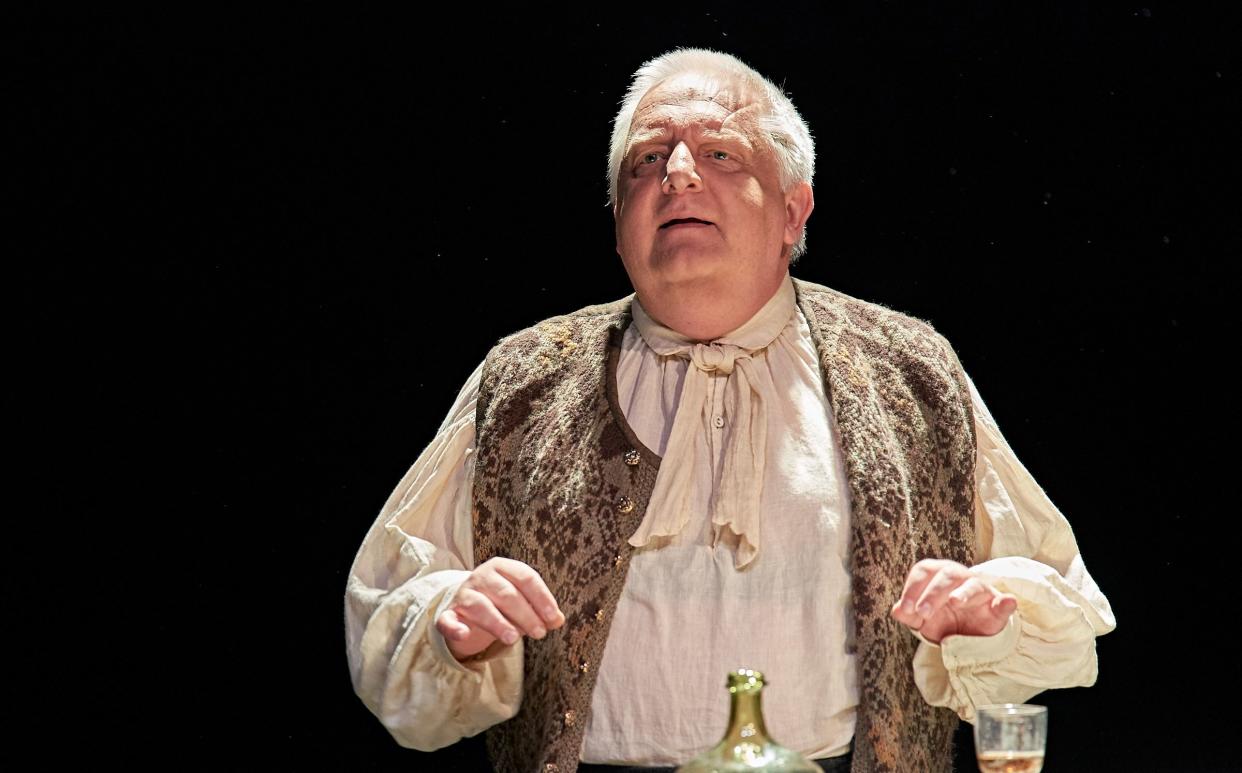Bach and Sons, Bridge Theatre, review: Simon Russell Beale brings the Baroque to life

Across his commanding stage career, Simon Russell Beale has excelled at playing isolated, emotionally complex men. For Nicholas Hytner at the National in 2012, he was a peerless Timon of Athens, flipping from benign spendthrift to sniping misanthrope, and latterly, in a Covid-curtailed Christmas Carol at the Bridge, he was a Scrooge more sorrowful than snarling.
Now this winning pair of talents have reunited for a fresh variation on Beale’s thematic forte. At 60, he plays Johann Sebastian Bach in Nina Raine’s Bach and Sons, which strives to delve into the life and career of one of the greatest composers of all time. It’s no mean ambition: Bach’s personal details are as much wreathed in banality as mystery. His biographer John Eliot Gardiner deemed his writing “pedestrian and opaque. We sense entrenched attitudes but seldom a beating heart.”
Raine, ever astute, doesn’t attempt to sensationalise things, foregrounding the frustrations of bread-winning and marital discord. Whisking us from his 1720s days as Kapellmeister in K?then, through productive decades, onto decline in Leipzig, where he lived until his 1750 death, she makes a virtue of his struggles and has found a way into understanding the man and his art through his vexed relationship with his sons.
Bach had six (surviving) boys, but the evening centres on his eldest (Wilhelm) and second eldest (Carl – “CPE”), who are under his tutelage as fledgling composers but already feel themselves under their old man’s thumb. The arch-perfectionist favours Wilhelm but dispenses blunt comments to both; his reflections on their wayward (or innovative) approach to fugue-writing crystallise as he asserts the need for rigorous discipline, and belief in the sanctity of the musical tradition of his God-fearing era.
The script deftly imparts information through passing erudition, entertaining quips and old-fashioned familial quarrelling. Surprisingly, Raine offers vignettes of the sadness of the women orbiting Bach – the endless pregnancies, the sexual rejections – but doesn’t dwell much on female cares. She has the measure of Bach’s music and, equally impressively, the father-son dynamics.
The performances, conducted under a Cubist storm-cloud of suspended harpsichords, offer a flesh-and-blood counterpoint: the emotionalism of Samuel Blenkin’s recriminatory Carl contrasting with the clenched self-containment of Beale’s unassuming genius. Without appealing for our sympathy, his Bach – sturdy, sage, often rapt in reverie by candlelight – suggests a man more griped against than griping. He combines humility with defiance, wielded magnificently against a bullying Frederick the Great (a lordly Pravessh Rana).
With Beale pretend-playing at a keyboard, you get a brush with Bach’s “greatest hits” here (Air on the G String, Magnificat and more). But the music isn’t diverting filler. Structured a bit like a fugue – competing voices, a beautiful resolution – the piece deploys Bach’s works to speak for him when words fail, and in so doing it hymns the glory of music itself. This reaches a peak in the mournful second half, the composer’s eyes filled with sadness as the chaconne from Partita for Violin No 2, read here as a ghostly lament for his dead first wife (Pandora Colin’s careworn Maria Barbara), fills the room. A bold play of ideas, then, but also an invitation to tears; after the indescribable year we’ve had, it’s a stirring and unmissable occasion.
Until September 11. Tickets: 0333 320 0051; bridgetheatre.co.uk